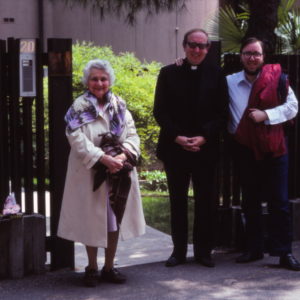 This week, Slant caught up with poet Jeanine Hathaway, whose new collection, Long after Lauds, released July 15th. In our conversation, Jeanine talked about the writing life, why she writes about rhinos, and what it means to write from the perspective of an “ex.” Check out the full Q&A below.
This week, Slant caught up with poet Jeanine Hathaway, whose new collection, Long after Lauds, released July 15th. In our conversation, Jeanine talked about the writing life, why she writes about rhinos, and what it means to write from the perspective of an “ex.” Check out the full Q&A below.
Why did you title your collection Long After Lauds?
In monastic life, the first hour of daily prayers, Matins, roused the community to wake up. Wisely, the second hour was Lauds, which means praise—praise with that freshly-awakened consciousness. In this way, such an attitude toward the world, seen and unseen, could be absorbed before breakfast. The poems in Long After Lauds continue that tradition decades later, though outside a community, of waking up, reflecting, discerning what there is to praise. And how. And whom.
There are several “Ex-Nun” poems in Long After Lauds, and a few written from the perspective of an ex-wife, an ex-teacher. What does it mean to write as an “ex”?
The thing about the past is that it’s never entirely past. “Ex” is not only a prefix but a Latin preposition that means “out of” or “away from.” In a book about building a tree house, the designer says it’s a prospect and a refuge. Writing from the vantage point of an “ex” is like that. How I look at the world now is affected by sensibilities cultivated in former circumstances. I don’t put an X over those circumstances except in the way of, say, a treasure map: X marks the spot where I might discover something important, enriching. From the prospect and refuge of the present in figurative language I can explore a past that has moments worth examining.
In the poems “Whose Expectation” and “A Long Engagement” a rhinoceros is the central figure. Does this animal have a particularly special significance to you?
When my daughter was newly wed, she lived half the continent away. On that first Christmas alone, I took myself to the zoo for distraction from self-pity. The bitter cold pushed me into the warmth of the veldt building. There I came upon the scene of another species as “a living nativity”: the father rhino was in his own pen next to the pen of mother and daughter asleep in their hay. My self-absorption gave way to wonder. Over the years, I’ve continued to explore rhinos both as themselves and as metaphors, mysterious and endangered.
Long After Lauds is your fourth book, preceded by a novel and two poetry collections. What was the process of writing this collection like for you? How has your writing life changed over the course of your career?
This book includes many of the poems from the chapbook, The Ex-Nun Poems, which seems like double-dipping. I did this because I want the reader to understand that a monastic formation informs everything. Writer Karen Armstrong says the religious novitiate is a period of initiation so thorough its effects cannot be entirely undone. By including the ex-nun poems in here, all the other poems bear witness to that. Over the course of my career, my writing life has matured by being a close reader, teacher, mother, a woman engaged in the lives of my family, students, community. One can call this practice Keatsian “negative capability,” or compassion. I intend my writing life to offer an imaginative invitation to non-dualism, one that describes relationships richly textured by love.
You’ve taught literature and creative writing at Wichita State University and served as a mentor in the MFA program at Seattle Pacific University. What is one piece of advice you would give to budding writers?
Read the classics, aloud, to digest the tradition, the forms, until you embody them in your own central stillness. That’s more than one piece of advice, but eventually these pieces kaleidoscopically come together in a unified field. Read, listen to your own or another’s voice, memorize, build up the knowledge of various technical moves so they feel as natural as physical habits, muscle memory. Plus they’re useful when you’re bored or have exhausted the personae and techniques you’ve come to rely on. There’s more than one way.
In Long After Lauds, you take your readers to some unexpected places: from the cloister to the depths of the ocean, from the Champs-Elysees to an American desert highway, from adult tap classes to Comicon. Curiosity and exploration are a common thread throughout the collection. So, now that this book has been completed, what’s ahead? Where will you take us next?
Next, I will take you to France, particularly Orleans in 1981 and 1429. It’s a memoir in poetry in which Joan of Arc’s influence continues. In a different project, more rhino poems ultimately take the form of a kind of bestiary.




